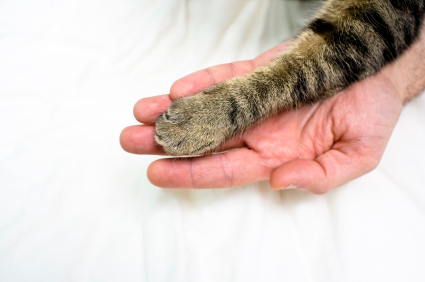Arthritis is a very common condition in our middle-aged to older companion animals. It is estimated to be present in 20-25% of our senior dogs, and up to 90% in our senior cats! It is very common to think “oh, he’s just getting older” but your pet could be silently suffering from painful arthritis.
Here are some common signs of arthritis in your furry loved one:
Limping: You may see your pet limping or favoring one leg all of the time, or it might be more noticeable after he or she first gets up and as they “warm up” it will disappear.
Difficulty with jumping/stairs/getting into the car: Your dog or cat may have difficulty moving in the same ways that they used to i.e. they may start hesitating when they are jumping on the couch or into the car, or they might struggle with or avoid the stairs. The signs might be very subtle especially in cats but you might notice that they are no longer jumping as high or as frequently as they used to.
Changes in behavior: Animals can have arthritis in any joint, and that includes the joints in the spine. Back and neck pain can cause a once good natured animal to become reclusive and aggressive. Other signs can be that they might shy away from affection, have issues with house soiling, and can have a hunched appearance to their back.
Tiredness: Animals that are suffering from arthritis might struggle with long walks or walking at all. They also might spend a good part of their day sleeping or laying down.
Changes in grooming: When cats are painful they stop grooming and changes in their hair coat quickly become evident. Cats will also stop their scratching behavior, and their nails will become long and brittle. Dogs, on the other hand, will sometimes over groom in times of pain. They will continuously lick an area of skin over a painful, arthritic joint, forming a wound know as a“lick granuloma.“
Although arthritis cannot be cured, talk to us at Acadia Veterinary Hospital if you are noticing any of these signs in your middle-aged to older dog. There are several natural and medicinal therapies that can greatly benefit your pet`s quality of life.
There are also some changes you can make at home that can help your arthritic pet. A warm, orthopedic foam bed helps a great deal, and if possible a ramp or steps to help with jumping in and out of places. A litterbox with low sides helps cats, as well as having their litterbox, food etc. all on one level. Dogs benefit from regular exercise and weight management. Regular exercise can be a 15-20 minute leash walk every day, swimming several times a week, or 20-30 minutes of gentle every day. Cats benefit from daily exercise as well but it can be a challenge. Play revolving around treats or food will sometimes get your older feline playing – aim for 10-15 minutes a day of play if possible!




